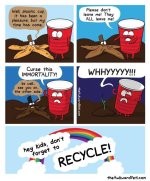Jarhyn
Wizard
- Joined
- Mar 29, 2010
- Messages
- 14,808
- Gender
- Androgyne; they/them
- Basic Beliefs
- Natural Philosophy, Game Theoretic Ethicist
Not too long ago, a friend of mine posted a thing on Facebook saying that plastic should be recycled because it'll just stay in a landfill forever if we do not. In other places, I've seen it said that 'who cares, it's cheaper and easier to make new rather than recycle.
But looking at both, a thought hit me: evolution doesn't care. Plastic burns hot, sooty, and for a long time. There's a lot of chemical energy in most plastics, and that means that something, eventually, will evolve to eat them. Then I thought of the applications we use plastics for. Sure, they're used for disposables because plastics are generally cheap, but they're also used for structure, piping, insulation, and a lot of other applications that are expected to last decades, if not centuries. The more evolvers are exposed to plastics, the more opportunity that one which happens to have a mutation to eat them will have the opportunity to succeed with that evolution. Landfills expose a lot of plastic to a lot of bacteria. Ergo, throwing plastic away isn't viable, not because it doesn't biodegrade, but rather because we can't afford to let it START biodegrading. It is not it's expensiveness which should drive us to recycle, but the expensiveness of losing the ability to count on plastics AT ALL.
Thoughts?
But looking at both, a thought hit me: evolution doesn't care. Plastic burns hot, sooty, and for a long time. There's a lot of chemical energy in most plastics, and that means that something, eventually, will evolve to eat them. Then I thought of the applications we use plastics for. Sure, they're used for disposables because plastics are generally cheap, but they're also used for structure, piping, insulation, and a lot of other applications that are expected to last decades, if not centuries. The more evolvers are exposed to plastics, the more opportunity that one which happens to have a mutation to eat them will have the opportunity to succeed with that evolution. Landfills expose a lot of plastic to a lot of bacteria. Ergo, throwing plastic away isn't viable, not because it doesn't biodegrade, but rather because we can't afford to let it START biodegrading. It is not it's expensiveness which should drive us to recycle, but the expensiveness of losing the ability to count on plastics AT ALL.
Thoughts?

